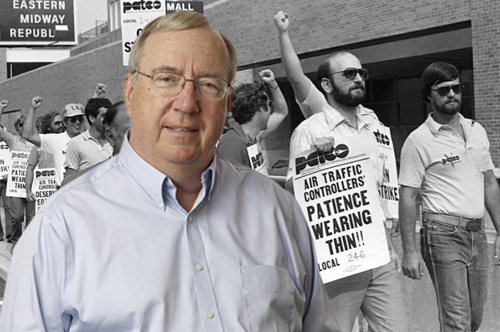
WASHINGTON (PAI ) — Rulings on: discrimination against union workers during bargaining; holding joint employers—a corporate headquarters and its local franchise-holders—responsible for obeying, or breaking, labor law; use of company e-mail systems to announce union meetings.
These National Labor Relations Board decisions, and more, are under threat, according to a memo from the agency’s new general counsel, Peter Robb. In so many words, he wants to stop or reverse all pro-worker board rulings of the last eight years.
Robb, nominated by President Donald Trump, took over the agency’s top enforcement post on Nov. 17. He succeeded Richard Griffin, the former general counsel who, before that, had been the lead counsel for the Operating Engineers union. Griffin’s term ended Nov. 1.

By contrast, Robb, a management-side labor lawyer from Vermont, was the young attorney in the Federal Labor Relations Authority who, 36 years ago, drew up the memo justifying GOP President Ronald Reagan’s firing of the Air Traffic Controllers.
Robb’s position is important: The NLRB General Counsel is both its top day-to-day manager and the decision-maker on what cases to pursue before the full board or in the courts.
No sooner did he enter the GC’s office than Robb sent out a memo to all NLRB regional directors on Dec. 1, freezing enforcement actions and indicating he wants to roll back dozens of NLRB pro-worker rulings handed down in the last eight years, when Democratic President Barack Obama had named a board majority.
Robb also said any new initiatives will come to a screeching halt.
“Cases should be processed and complaints issued according to existing law. No new theories will be presented on cases that have been fully briefed to the board, to avoid further delay,” his memo said. And “the general counsel will not offer new views” on NLRB’s court cases, unless the board or the courts order him to do so.
But the heart of the memo is Robb’s order that cases “involving significant legal issues” should be sent to the board’s advice division in advance—including cases during the last eight years where “the board overruled precedents and involved one or more dissents.” The implication is Robb wants to reverse those pro-worker rulings.
That covers virtually all the key cases the labor board, which governs worker-boss relations in most private industry, decided. That’s because, by law, no political party can have more than three of the five NLRB members, and the minority two. So 3-2 votes on notable issues, with dissents, are common.
And then Robb listed some of those cases, in groups, that he wants to override, or, as he put it, “provide alternative analysis” to the board’s five members. One case he wants to override lets union members use employers’ e-mail to post meeting notices, rather than restricting them to bulletin boards, for example. Another lets union reps have a wider range of employer discipline to tackle when standing up for workers who invite them into the meetings with the boss.
And while the National Labor Relations Act legalizes workers joining together—in unions or otherwise—for “mutual aid and protection,” Robb’s memo says that shouldn’t apply where only one worker is involved. The 2014 Fresh & Easy Neighborhood Market case extended the law to a sole woman worker, who was subject to sexual harassment on the job.
Another big one is the board’s “joint employer” ruling, which former general council Griffin favored, holding the big franchisor, such as McDonald’s headquarters, equally liable with the local franchisee for following or breaking labor law in relations with their workers.
Griffin made the practical point that the franchising firm’s headquarters governs virtually all aspects of labor relations for its local affiliates, from what uniforms workers wear to what prices they can charge—and what labor laws to obey, or not.
Robb did not forecast what impact his memo and directions to the board’s regions would have on the quantity of cases the NLRB handles, or on any change in justice, other than to say he would review everything. The AFL-CIO’s general counsel’s office, which includes former NLRB General Counsel and Board Member Craig Becker, was unable to return a call to discuss Robb’s memo.










